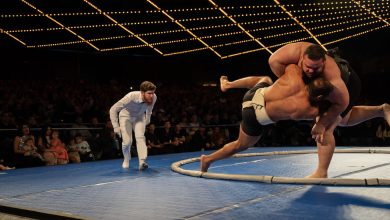Pac-12 Commissioner Keeps It Professional, but Pointed, After Defections

LOS ANGELES — When the Pac-12 Conference’s schools congregated Friday at a downtown theater for the summer ritual of football media day — and yes, all the coaches were invited — it carried the air of an awkward family reunion.
Imagine Southern California and U.C.L.A., the West Coast athletic cornerstones that announced a month ago that they would be bolting for the Big Ten, as the ones stepping gingerly through the front door, not sure if they were going to be shunned, given a side eye or offered a limp handshake.
“It feels strangely familiar,” said Lincoln Riley, the new U.S.C. coach, who went through a similarly sticky exercise last summer at Oklahoma, which along with Texas announced it would be jumping to the Southeastern Conference from the Big 12. “There’s been some hard feelings, but everyone has kept it professional.”
Professional, perhaps, but still pointed.
Utah Coach Kyle Whittingham, whose team made its first trip to the Rose Bowl last season, referred to the conference a couple of times as the Pac-10, which may not have been a slip of the tongue. The athletic directors of the two departing schools, U.S.C.’s Mike Bohn and U.C.L.A.’s Martin Jarmond, were not invited to a meeting of their counterparts on Thursday and stayed away from media day by mutual agreement.
Pac-12 Commissioner George Kliavkoff, speaking publicly for the first time since the Los Angeles schools announced their departure on June 30, called their move a money grab — it could add $50 to $70 million annually in television revenue — that sells out athletes, who will have to travel repeatedly to the East Coast for conference games.
He singled out U.C.L.A., which he said had received withering criticism from athletes, parents, faculty and politicians, including Gov. Gavin Newsom of California, who last week directed the University of California to issue a report next month on the impact of the move on athletes and on U.C. Berkeley, the Northern California sister school of U.C.L.A.
“We think there’s immediate regret among almost every constituent in those communities, and we think those regrets are going to grow over time,” Kliavkoff said in an interview. “Those are bad decisions; those are financial decisions at the expense of student athletes.”
Kliavkoff, a former media executive who had no college sports experience when he took over last July, has spent the past month trying to keep his conference from imploding.
He made clear that the conference was actively looking to expand, engaged in negotiations for new television and media deals (which he expected to include a digital partner) and adamant that schools that might be considering their options — particularly Washington and Oregon — would be best served remaining with a reconstituted Pac-12. He also hinted that Pac-12 schools might begin scheduling football games in Los Angeles to maintain a presence there.
An indication of Kliavkoff’s feistiness came when he was asked at a news conference about Brett Yormark, the newly hired Big 12 Commissioner, who remarked recently that his conference — which has tried to poach Pac-12 schools — is “open for business.”
“I appreciate that,” Kliavkoff said. “We haven’t decided if we’re going shopping there or not.”
Just as the departures of Texas and Oklahoma to the SEC set off speculation and panic that the remaining Big 12 schools had to jump while they had the chance, a similar wave was set off this summer across the Pac-12. The next big domino will be whether Notre Dame, which for decades has clung to its independence in football, goes to the Big Ten, which then could pursue schools like Washington and Oregon, or perhaps Stanford and Cal.
Oregon Athletic Director Rob Mullens said geography was no longer the factor it used to be.
“Is it ideal from an academic standpoint? No,” he said. “Is it a new world order? Maybe.”
(U.C.L.A. Coach Chip Kelly, responding to a question from a French Canadian reporter, quipped, “We’re expanding, but we’re not going to Quebec.”)
In the immediate aftermath of the Los Angeles schools’ announcement, the remaining Pac-12 presidents, chancellors and athletic directors have met at least twice a week. The caucuses began feverishly — “people saying irrational things, doing irrational things, acting scared understandably,” Kliavkoff said — but have become more candid and frank, he and two athletic directors said.
“Here’s what’s important: We need enough money from media rights and other deals to compete at a national level,” he said, estimating that the Los Angeles schools accounted for 25 to 30 percent of the Pac-12’s media-rights value. “That doesn’t mean we need Big Ten money. What they need is enough to compete at a very high level.”
Patching up his relationship with Kevin Warren, the Big Ten commissioner, may be even more delicate than keeping his conference together.
Last August, Warren and Kliavkoff joined Jim Phillips, the commissioner of the Atlantic Coast Conference, on a video conference call with the news media to announce an alliance that would help the conferences with scheduling and other initiatives, like a yearlong celebration of Title IX that was announced last month.
The alliance was seen as a move to fend off the SEC’s increasing influence.
The commissioners, in that news conference, were asked if there was a binding agreement?
Kliavkoff said it wasn’t necessary.
“It’s an agreement among three gentlemen,” he said.
Asked on Friday if he still stood by that statement, Kliavkoff forced a smile.
“That’s a great question,” he said. “But I’m not going to touch that.”



